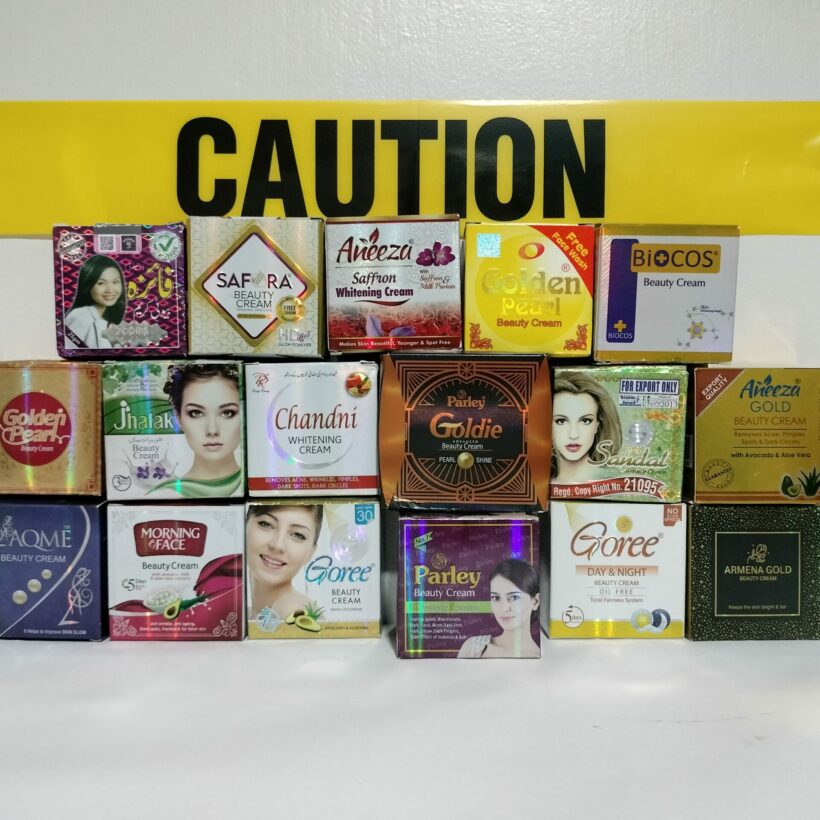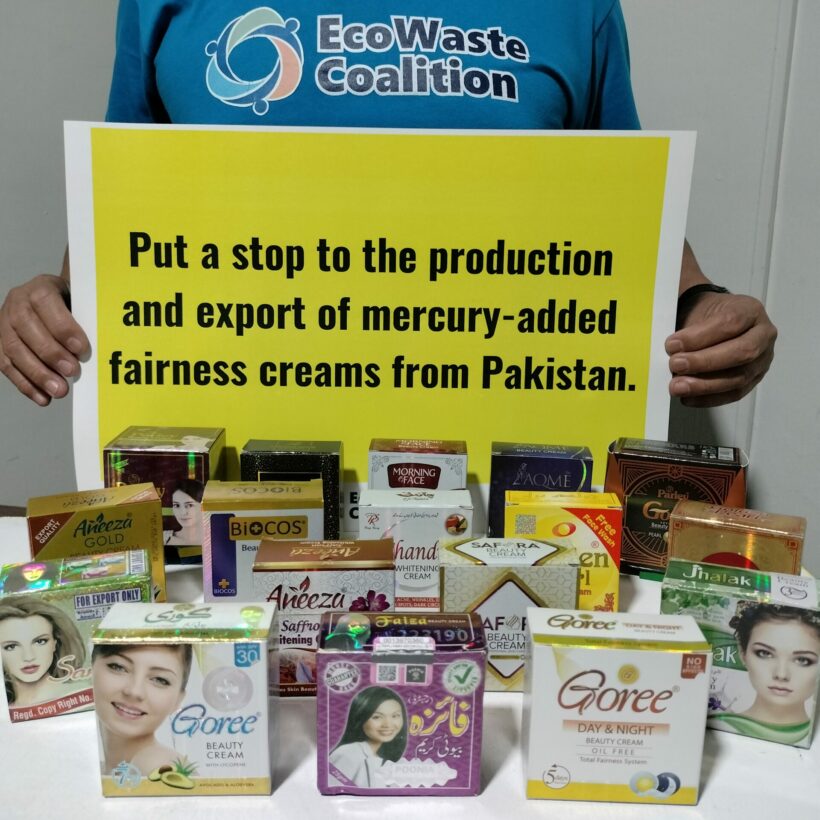16 February 2023, Quezon City. In its latest bid to stop the proliferation of banned mercury-added cosmetics in the local market, including e-commerce sites, the toxics watchdog group EcoWaste Coalition has sought the help of the Government of Pakistan.
Through a letter sent today via e-mail, the group requested the Government of Pakistan to help solve a public health problem involving the unlawful export to the Philippines of 17 “made in Pakistan” beauty creams with high levels of mercury in violation of the Minamata Convention on Mercury. The letter was addressed to Federal Minister Sherry Rehman of the Ministry of Climate Change (MOCC) and Mr. Syed Mujtaba Hussain, the country’s National Focal Point for the Minamata Convention on Mercury,
The mercury treaty, which includes Pakistan and the Philippines among the state parties, has set a phase-out date for cosmetics such as skin-lightening products with mercury content above one ppm. The treaty stipulated 2020 as the date after which the manufacture, import or export of such mercury-added cosmetics shall not be allowed.
“While we appreciate the efforts of the MOCC and the Pakistan Standards and Quality Control Authority (PSQCA), it is apparent that much needs to be done to enforce the phase-out of mercury-added cosmetics and protect consumers from the adverse health effects of chemical whiteners, which promote unnatural changes to darker skin tones and falsely equate beauty with whiteness,” wrote Aileen Lucero, National Coordinator, EcoWaste Coalition.
“We respectfully appeal to the Government of Pakistan to intensify current efforts to stop mercury use in the manufacture of cosmetics such as fairness or whitening creams, strengthen compliance monitoring, correct the misuse of ‘Pakistan Standards’ certification logo, and tighten customs checks to halt the export of mercury adulterated cosmetics to the Philippines and elsewhere,” she said.
Based on the chemical screening performed by the group using an X-Ray Fluorescence (XRF) device, the mercury content of the 17 analyzed products ranged from 766 to 58,400 parts per million (ppm), way in excess of the one ppm limit under the Minamata Convention on Mercury, as well as the ASEAN and the EU Cosmetic Directives. Twelve of these products had over 10,000 ppm of mercury and five even carried the “Pakistan Standards” certification logo.
Despite the lapse of the 2020 phase-out date, non-compliant cosmetic manufacturers in some countries continue to produce and export fairness or whitening creams with high levels of mercury that even exceed hazardous waste specifications. These products find their way to other countries like the Philippines through the illegal importation by unscrupulous dealers and unsuspecting consumers, the EcoWaste Coalition noted.
Of the 17 mercury-added beauty creams in question, five were manufactured in 2022, two in 2021, five in 2020, four in 2019 and one in 2018, the group pointed out.

Among these dangerous cosmetics were Goree Beauty Cream with Lycopene and Goree Day & Night Beauty Cream, which the Food and Drug Administration (FDA) of the Philippines tested in 2017 and found to contain mercury above the one ppm limit. Regulatory agencies in Bangladesh, Brunei, Hong Kong, New Zealand, Singapore, United Kingdom, and the USA (California and New York) had also tested these Goree products and taken action against their importation and sale.
Aside from the two Goree cosmetics, the FDA Philippines had also issued public health warnings against the purchase and use of AQME Beauty Cream, Parley Beauty Cream, Parley Goldie Advanced Beauty Cream, Parley Herbal Whitening Cream, Golden Pearl Beauty Cream (new packaging), Golden Pearl Beauty Cream (old packaging), Morning Face Beauty Cream, and Safora Beauty Cream due to their mercury content or for being sold without market authorization.
Also, two of the 17 analyzed cosmetics (Faiza Beauty Cream and Goree Beauty Cream) were among the cosmetics that failed the laboratory tests conducted by the PSQCA. And five of them (Aneeza Gold Beauty Cream, Chandni Whitening Cream, Golden Pearl Beauty Cream, Goree Beauty Cream and Faiza Beauty Cream) were among those found by the Bangladesh Standards and Testing Institution (BSTI) as exceeding the one ppm limit for mercury in cosmetics and subsequently banned.
“Pakistan’s immediate and decisive action will prevent and reduce consumer and occupational mercury exposures, as well as protect households, especially women of child-bearing age and children, from being contaminated with mercury,” the EcoWaste Coalition emphasized.
Last February 6, the EcoWaste Coalition, together with its Thai and regional NGO partners, delivered a letter to FDA Thailand urging it to take action against mercury-added cosmetics being exported and sold to Filipino consumers, especially in online shopping platforms.
Upon receipt of the said letter, FDA Thailand quickly launched an investigation, which has confirmed that 13 of the 14 products adulterated with mercury are illegal cosmetics. The investigation is still ongoing.
References:
https://www.fda.gov.ph/wp-content/uploads/2021/12/FDA-Advisory-No.2021-3043.pdf
https://www.fda.gov.ph/wp-content/uploads/2021/12/FDA-Advisory-No.2021-3055.pdf
https://www.fda.gov.ph/wp-content/uploads/2021/12/FDA-Advisory-No.2021-3057.pdf
https://www.fda.gov.ph/wp-content/uploads/2021/12/FDA-Advisory-No.2021-3059.pdf
https://www.fda.gov.ph/wp-content/uploads/2021/12/FDA-Advisory-No.2021-3060.pdf
https://www.fda.gov.ph/wp-content/uploads/2019/03/FDA-Advisory-No.-2019-074.pdf
https://www.fda.gov.ph/wp-content/uploads/2022/05/FDA-Advisory-No.-2017-289.pdf
https://www.fda.gov.ph/wp-content/uploads/2022/05/FDA-Advisory-No.-2013-053-A.pdf
https://www.incpak.com/health/faiza-beauty-cream-banned-in-pakistan/
https://blog.siasat.pk/psqa-orders-a-crackdown-against-low-quality-makeup-products/
https://www.tbsnews.net/bangladesh/bangladesh-bans-17-pakistani-face-creams-dangerous-levels-mercury-457510
https://sdpi.org/mercury-poisoning-associated-with-international-and-local-skin-whitening-creams-in-pakistan/publication_detail










